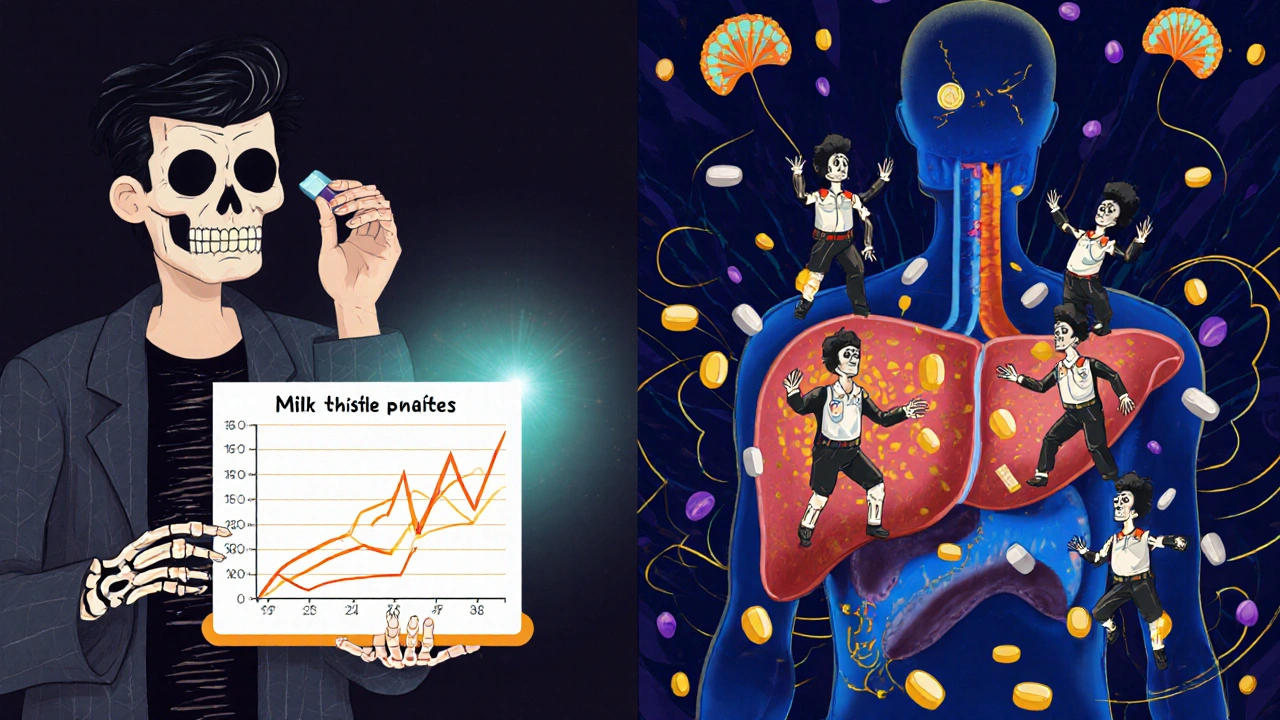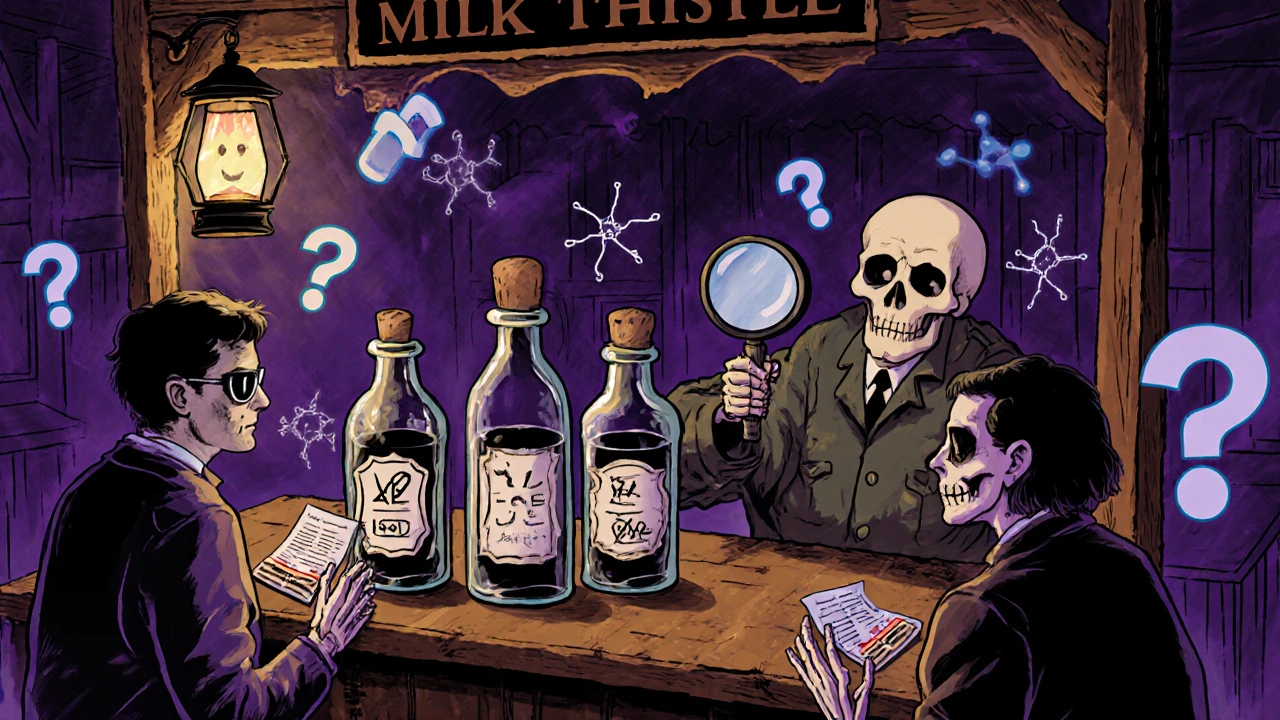Milk Thistle Drug Interaction Checker
This tool checks potential interactions between milk thistle and common medications. Based on scientific evidence, milk thistle (silymarin) can affect liver enzymes (CYP450), potentially increasing or decreasing medication effectiveness.
Your Potential Interactions
The following interactions are based on scientific evidence. Always consult your healthcare provider before taking milk thistle with medications.
When you take milk thistle for your liver, you might think you’re just doing something gentle and natural. But what if that supplement is quietly changing how your other medications work? It’s not a myth - milk thistle can interfere with drugs your doctor prescribed, and the effects aren’t always obvious. If you’re on blood thinners, seizure meds, statins, or even some cancer treatments, this isn’t something to ignore.
What Exactly Is Milk Thistle Doing in Your Liver?
Milk thistle isn’t just a trendy herb. Its active ingredient, silymarin, is a mix of compounds - mostly silybin - that have been studied for over 50 years. German scientists first noticed it protected the liver in the 1960s, and today, millions take it for fatty liver, detox support, or just general liver health. But here’s the catch: silymarin doesn’t just sit there. It talks to your liver’s enzyme system - the same one that breaks down about 70% of all prescription drugs.
Your liver uses enzymes called cytochrome P450 (CYP) to process medications. The big players here are CYP3A4, CYP2C9, and CYP2D6. These enzymes are like factory workers on an assembly line. When milk thistle shows up, it can either slow them down (inhibit) or speed them up (induce), depending on how long you’ve been taking it and how much you’re using.
When Milk Thistle Slows Down Your Meds
Take warfarin, for example. It’s a blood thinner with a razor-thin safety margin. Too little, and you risk clots. Too much, and you could bleed internally. Studies show silymarin can inhibit CYP2C9 - the enzyme that clears warfarin from your body. A 2021 lab study found a 15-23% drop in CYP2C9 activity at typical supplement doses. That doesn’t sound like much, but for warfarin, even a 10% change can spike your INR levels.
Real-world reports back this up. On Reddit, over 40 people reported sudden INR spikes after starting milk thistle. Some had to cut their warfarin dose by 20-35% just to stay in range. That’s not a coincidence. It’s a direct interaction.
Same goes for phenytoin, used for seizures. If milk thistle slows its breakdown, levels rise. Seizures might stop - but you could also develop dizziness, nausea, or even toxicity. One case study in a 2020 journal documented a patient whose phenytoin levels jumped 40% after adding milk thistle. He had no idea the supplement was the cause.
What About When It Speeds Things Up?
Here’s where it gets even weirder. Milk thistle doesn’t always slow things down. A 2020 study found that after 28 days of daily use, CYP2C9 actually became more active - up by 12.7%. That means drugs might get cleared faster than normal, making them less effective.
Imagine you’re on a medication that needs steady levels to work - like an immunosuppressant after a transplant. You start milk thistle, feel fine for two weeks, then suddenly your drug levels drop. Your body starts rejecting the new organ. No warning. No symptoms until it’s too late.
This biphasic effect - inhibition at first, then induction - is why experts can’t give a simple answer. One day, milk thistle might raise your drug levels. Two weeks later, it might lower them. The timing matters as much as the dose.

How Much Is Too Much?
Most supplements contain 140-420 mg of silymarin per day. That’s what’s used in clinical trials. But here’s the problem: not all products are created equal. A 2022 FDA study found only 32% of milk thistle supplements on the market actually contained what the label said. Some had half the silymarin. Others had none.
And even if the dose is right, absorption varies wildly. Silybin - the most active part - only gets absorbed at 20-50% efficiency. That means two people taking the same pill could get completely different amounts into their bloodstream. Genetics play a role too. If you have a CYP2C9 gene variant that already makes you a slow metabolizer, milk thistle could push you over the edge.
How Does It Compare to Other Liver Supplements?
Let’s say you’re looking at alternatives. N-acetylcysteine (NAC) supports liver health through glutathione, but it barely touches CYP enzymes. Artichoke extract? It consistently inhibits CYP2C9, like milk thistle - but only that one enzyme. Milk thistle? It plays with multiple systems, making its behavior harder to predict.
And compared to prescription liver drugs like ursodeoxycholic acid? Milk thistle wins on safety. In over 3,800 people studied, only 1.2% reported side effects - mostly mild stomach upset. Pharmaceuticals had nearly 9%. But safety doesn’t mean risk-free. When you’re on multiple meds, especially ones with narrow therapeutic windows, even a small interaction can be dangerous.
What Do Experts Really Think?
There’s a split in the medical world. Dr. Joseph Pizzorno, a leading voice in natural medicine, says the risks are exaggerated. He points out that in 40 years of widespread use, only 12 case reports even suggest a possible interaction - and none proved cause and effect.
But Dr. David Bernstein, a top hepatologist, disagrees. He says we don’t have enough consistent data to call it safe. The European Medicines Agency says no clinically relevant interactions are expected. The U.S. NIH’s LiverTox database says it’s “possibly interacting” with CYP2C9 drugs. And the FDA doesn’t require supplement labels to warn about drug interactions at all.
That leaves you - the patient - in the middle. You’re told milk thistle is safe. But your doctor warns you to be careful. Who do you trust?

What Should You Do If You’re on Medications?
If you’re taking any of these, think twice before adding milk thistle:
- Warfarin (Coumadin)
- Phenytoin (Dilantin)
- Statins like simvastatin or atorvastatin (CYP3A4 substrates)
- Immunosuppressants like cyclosporine or tacrolimus
- Some antidepressants and anti-anxiety meds (CYP2D6 substrates)
- Chemotherapy drugs
Here’s what to do:
- Don’t start milk thistle without telling your doctor or pharmacist.
- If you’re already taking it, get your drug levels checked - especially if you’ve been on it more than 10 days.
- For warfarin, check your INR weekly for the first month after starting or stopping milk thistle.
- Use only standardized extracts (70-80% silymarin). Avoid whole-herb powders - they’re unpredictable.
- Wait at least 48 hours after stopping milk thistle before checking baseline drug levels. Enzyme changes don’t reverse instantly.
What About People Who Use It Without Problems?
Many do. On Amazon, over 97% of reviews don’t mention drug interactions. People with NAFLD report better liver enzymes. Those on hepatitis C antivirals like sofosbuvir say they’ve taken milk thistle for months with no issues. That’s real. But it’s not the whole story.
Just because it worked for someone else doesn’t mean it’ll work for you. Genetics, diet, other meds, even gut bacteria affect how your body handles silymarin. What’s safe for one person could be risky for another.
The Bottom Line
Milk thistle isn’t dangerous. But it’s not harmless either - especially when you’re on liver-metabolized drugs. The science is messy. The products are inconsistent. The warnings are missing from labels. And the stakes? High.
If you’re healthy and just taking it for “detox,” the risk is low. But if you’re managing a chronic condition with medication, treat milk thistle like a drug - because in your liver, it acts like one. Talk to your provider. Get tested. Don’t assume natural means safe. Your liver might thank you - but your meds might be the ones that really need the warning.
Can milk thistle affect my blood thinners like warfarin?
Yes. Milk thistle can inhibit the CYP2C9 enzyme, which breaks down warfarin. This can cause your INR to rise, increasing bleeding risk. Several real-world cases show INR levels spiking after starting milk thistle, requiring warfarin dose adjustments. If you’re on warfarin, check your INR weekly for the first month after starting or stopping milk thistle.
Does milk thistle interact with statins?
Possibly. Statins like simvastatin and atorvastatin are broken down by CYP3A4. While most clinical trials show no significant interaction at standard doses, some individuals may experience higher statin levels due to enzyme inhibition. There’s also a risk of delayed induction after 7-10 days, which could lower statin effectiveness. If you’re on statins, monitor for muscle pain or weakness - signs of potential toxicity.
How long does it take for milk thistle to affect liver enzymes?
Inhibition of enzymes like CYP2C9 can happen within 24-48 hours of starting milk thistle. But enzyme induction - where the liver starts breaking down drugs faster - usually takes 7-10 days of consistent use. This means effects can change over time, making interactions hard to predict. Always monitor drug levels after 10 days of use.
Are all milk thistle supplements the same?
No. Only 32% of supplements tested in a 2022 FDA study met their labeled silymarin content. Some had half the amount. Others had none. Standardized extracts (70-80% silymarin) are more reliable than whole-herb powders. Look for third-party testing (USP, NSF, or ConsumerLab) and avoid products without clear dosing info.
Can I take milk thistle with my hepatitis C meds?
Current evidence suggests it’s generally safe. Direct-acting antivirals like sofosbuvir/velpatasvir aren’t significantly metabolized by CYP enzymes, so milk thistle doesn’t interfere. Many patients report no issues using both together. Still, consult your hepatologist - individual responses vary, and long-term data is limited.
Should I stop milk thistle before surgery?
Yes. If you’re on blood thinners, seizure meds, or other liver-metabolized drugs, stop milk thistle at least 7-10 days before surgery. This gives your liver time to reset enzyme activity and reduces the risk of unexpected drug interactions during anesthesia or post-op recovery. Always inform your anesthesiologist about all supplements you take.
If you're managing a chronic liver condition and considering milk thistle, don't guess. Get tested. Track your meds. Talk to your pharmacist. Your liver may be the target - but your drugs are the ones that could get caught in the crossfire.


Shubham Semwal
November 27, 2025 AT 20:12Look, I've been taking milk thistle for three years while on warfarin and my INR's been rock solid. You guys act like this stuff is nuclear waste. The science? Messy. The anecdotes? Overblown. I've seen more people hurt by statins than by milk thistle. Stop fearmongering.
Sam HardcastleJIV
November 29, 2025 AT 08:21It is, indeed, a matter of considerable scientific and pharmacological gravity, one which demands not merely casual consideration, but rigorous, evidence-based scrutiny. The notion that botanicals may modulate hepatic enzymatic activity with such profound clinical implications is, in my view, both alarming and insufficiently addressed by regulatory bodies.
Mira Adam
November 29, 2025 AT 22:18Oh please. You think people don't know this? You think the FDA doesn't know this? They don't care. Big supplement companies pay off regulators. You're not being warned because they want you to keep buying this 'natural' crap while your liver turns to mush. Wake up.
Sue Haskett
November 30, 2025 AT 23:37Hi everyone-just wanted to say this is such an important conversation. I'm a pharmacist, and I see this every week. People come in thinking milk thistle is 'just a tea,' and then they end up in the ER because their INR spiked. Please, if you're on meds, talk to your provider. No shame in asking. Your health isn't a gamble.
Jauregui Goudy
December 1, 2025 AT 09:45THIS. IS. A. GAME. CHANGER. Seriously, folks-this post could save your life. I had a client on cyclosporine who started milk thistle for 'detox' and almost lost his transplant. We caught it because his levels dropped like a rock. Don't be that guy. Get tested. Track it. Your meds aren't optional. Neither is your liver.
Tom Shepherd
December 1, 2025 AT 16:34so wait so milk thistle can make your meds work too good or not good enough? like what even is the point then? i took it for a month and felt fine but now im scared to stop cause what if my liver crashes? help
Rhiana Grob
December 3, 2025 AT 02:26Thank you for sharing this nuanced perspective. I appreciate how you acknowledged both the potential risks and the reality that many people use milk thistle without incident. The key is awareness-not fear. Education, not alarmism. Let’s keep the conversation grounded in science and compassion.
Frances Melendez
December 4, 2025 AT 06:57Of course you're fine. You're probably one of those people who think 'natural' means 'safe' and 'doctor-approved' means 'corporate lie.' You're lucky you haven't killed yourself yet. Stop poisoning your body with herbs and actually listen to science for once.
Jonah Thunderbolt
December 5, 2025 AT 09:56Okay, but have you considered the metaphysical implications? 🤔 Silymarin doesn’t just interact with CYP enzymes-it interacts with your soul’s detox pathway. The liver is your body’s spiritual filter. When you take milk thistle, you’re not just altering pharmacokinetics-you’re realigning your chi with the ancestral wisdom of ancient German monks. 🌿✨ Also, my supplement has 99.9% silybin and comes in a crystal-infused bottle. It’s basically alchemy.
Rebecca Price
December 6, 2025 AT 20:03Shubham, I hear you-your experience matters. But let’s not dismiss the data just because it doesn’t match your personal story. I’ve worked with patients who had zero issues, and others who nearly died. It’s not about you-it’s about the people who don’t know they’re at risk. This post isn’t fear-mongering. It’s harm reduction. And that’s worth celebrating.
shawn monroe
December 8, 2025 AT 19:19Let’s get technical. CYP3A4 inhibition = increased AUC and Cmax of statins → rhabdomyolysis risk. CYP2C9 inhibition = prolonged warfarin half-life → elevated INR. Induction after 7–10 days = subtherapeutic concentrations → therapeutic failure. The biphasic nature is well-documented in *Clinical Pharmacokinetics* 2020. This isn’t anecdotal-it’s mechanistic. If you’re on a narrow TI drug, treat milk thistle like a drug. Because it is.
marie HUREL
December 9, 2025 AT 20:20I’m a nurse and I’ve seen this too. One woman on tamoxifen started milk thistle for hot flashes. Two weeks later, her cancer markers went up. Turns out the supplement lowered her drug levels. She didn’t know. No one told her. We need better labeling. We need more education. Not panic. Just… awareness.
Lauren Zableckis
December 11, 2025 AT 11:28My mom takes milk thistle with her blood pressure med and has been fine for years. Maybe it’s not a problem for everyone?